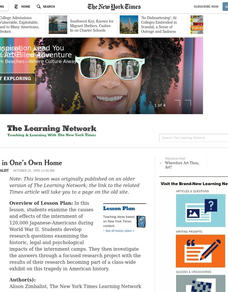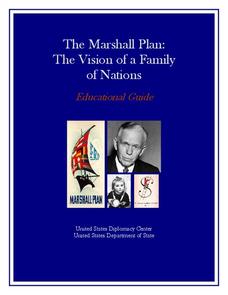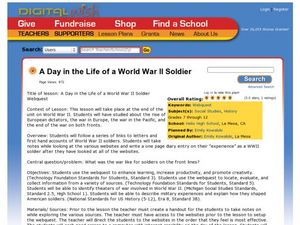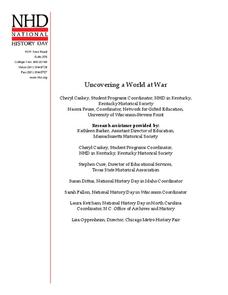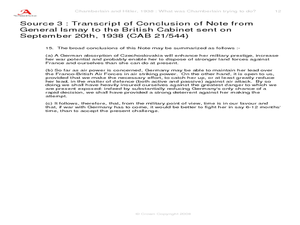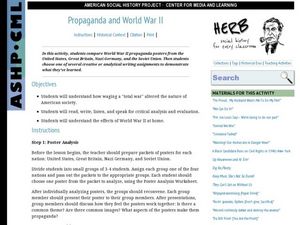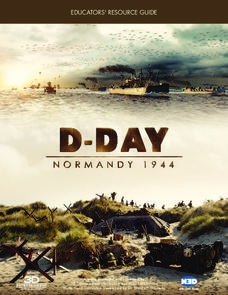Curated OER
World War II: The Pacific
Students explore the events in the pacific during World War II. In this World War II lesson, students use reference material to access information about significant locations in the War. Student debate the use of the atomic bomb to end...
Curated OER
Prisoner in One's Own Home
Examine the internment of Japanese-Americans during World War II. After reading an article from the New York Times and exploring the author's word choice, young readers find the central idea in the text and work on researching additional...
Curated OER
United States Entry into World War I: Some Hypotheses About U.S. Entry
Young scholars determine the most compelling evidence explaining why the U.S. entered WWI. They read and discuss a handout of reasons why the U.S. entered the war, and take a poll as to which reason was the most compelling.
Captain Planet Foundation
P is for Poppies
Explore the way local farming and rationing helped the war effort in World War I with a lesson plan on gardening. After learning about trench warfare, reading "In Flanders' Field" by John McCrae, and studying poppies, kids discuss the...
Curated OER
World War II: A Compartive Study through Literature
Students examine World War II through the use of literature. As a class, they brainstorm a list of words they relate to the war itself. In groups, they read various novels and view photographs showing the experiences of the Jews,...
Curated OER
Timeline - United States and Germany, Before, During, and After World War II
Students read novel Rosa's Miracle Mouse, research assigned years in small groups, and create timelines and Powerpoint presentations detailing interaction between Germany and the United States before, during, and after World War II.
Curated OER
Leaders, Laborers, and Other Perspectives of World War II
How did the women in France feel about their country’s involvement in World War II? Class groups are assigned a country involved in WWII, and individuals within the group adopt the point of view of leaders, laborers, businessmen, women,...
US Department of State
The Marshall Plan: The Vision of a Family of Nations
The European Recovery Act (aka the Marshall Plan) was designed to bring together and develop a spirit of cooperation among European nations after World War II. Class members examine the materials from the Marshall Plan exhibit and assess...
Curated OER
World War I
Eighth graders examine the condition of the world from 1880 until the start of World War I. After watching a PowerPoint presentation, they discuss the causes and effects of the war and complete a study guide with a partner. To end the...
Curated OER
Assignment Discovery Lesson Plan World War II
High schoolers examine primary and secondary documents about life on the homefront during World War II. In this World War II lesson, students research the conditions of daily life in the United Kingdom, the United States, and Germany...
Curated OER
A Day in the Life of a World War II Soldier Webquest
Students complete a web-quest into a day in the life of a World War II soldier. In this webquest lesson, students investigate what life was like for soldiers on the front lines during the second World War. They use note taking skills...
Curated OER
Evacuation: The Japanese Americans in World War II
Students examine Japanese internment camps of World War II. In this World War II instructional activity, students use primary and secondary sources to research the evacuation process and life within the internment camps. Students discuss...
National History Day
Uncovering a World at War
Has media always had an influence on public policy? After researching and reading news articles written during World War I, learners understand the influence of communication and media. They discuss articles in small groups and as a...
National Endowment for the Humanities
The New Order for "Greater East Asia"
Sometimes the New Order becomes synonymous with its implications for European countries, but what about its consequences for East Asia? The final instructional activity in a four-part series teaches scholars about World War II. High...
Curated OER
Filmstrip Worksheet: After World War II
In this World War II filmstrip worksheet, students review a film about the war as they respond to 15 fill in the blank questions. A word bank is included.
Curated OER
Women's Roles in Post World War II
Students discuss the role of women before, during, and after World War II. For this equality lesson, students plan how to make the workforce more equal among men and women after World War II. They research World War II and its effects on...
Facing History and Ourselves
The Weimar Republic: Historical Context and Decision Making
Did you know that way before Hitler became a dictator, he actually spent nine months in a German jail? Provide the background for the escalating point before the Nazi party took over in World War II through the exercises in the resource....
Curated OER
Chamberlain and Hitler, 1938--What Was Chamberlain Trying To Do?
Explore events prior to World War II. Learners view replicas of authentic photographs and hand written documents representing the viewpoints of Adolf Hitler and Neville Chamberlain. They discuss alternate viewpoints, consider historical...
Curated OER
Propaganda and World War II
What was the true meaning behind WWII propaganda posters? Historians analyze images from the U.S., Great Britain, Nazi Germany, and the Soviet Union, sharing findings in small groups. A poster analysis worksheet and all posters are...
Curated OER
Fifth Grade Social Studies
For this social studies worksheet, 5th graders answer multiple choice questions about World War II, the transcontinental railroad, slavery, and more. Students complete 25 questions.
Loudoun County Public Schools
World War I Causes Project
After completing this detailed and well-designed project, your young historians will be well-versed in their explanations of the reasons that various countries joined World War I! Learners design a picture book covering seven primary...
D-Day Normandy 1944
D-Day Normandy 1944
No study of World War II would be complete without an in-depth examination of the events of June 6, 1944. Pascal Vuong's D-Day Normandy:1944, is the perfect vehicle to convey the sheer magnitude of the events that have been called the...
Curated OER
Coming of Age During Japanese Occupation: Richard E. Kim's Lost Names: Scenes from a Korean Boyhood
Explore the implications of the Japanese occupation of Korea during World War II. Learners read Lost Names: Scenes from a Korean Boyhood, participate in classroom discussions about the novel and keep journals in which they respond to...
The New York Times
'The Century's Bitterest Journalistic Failure'? Considering Times Coverage of the Holocaust
Rich with primary sources and additional resources, this plan asks class members to think critically about newspaper coverage of the Holocaust. Focusing in particular on the analysis of the article "150th Anniversary: 1851-2001: Turning...



